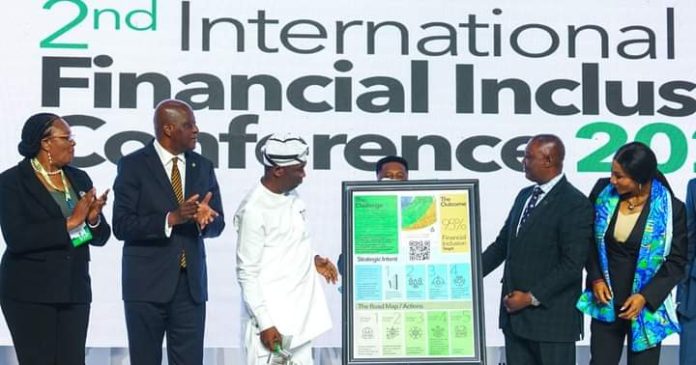The Central Bank of Nigeria (CBN), in collaboration with key stakeholders, hosted the second International Financial Inclusion Conference (IFIC) 2024 in Lagos, where Governor Olayemi Cardoso reaffirmed the bank’s commitment to financial inclusion as a cornerstone of Nigeria’s economic growth strategy. He emphasized that financial inclusion is pivotal to elevating Nigeria’s economy to a $1 trillion benchmark.
Driving Financial Inclusion Since 2012
In his keynote address, Governor Cardoso highlighted the progress made since the launch of the National Financial Inclusion Strategy (NFIS) in 2012. He credited the collaborative efforts of the CBN and its partners in rolling out targeted policies and initiatives aimed at reducing financial exclusion. These initiatives are designed to ensure that every Nigerian can access affordable financial services, ranging from basic savings accounts to micro-pension schemes, microinsurance, and digital payment platforms.
“The journey toward financial inclusion is about empowering underserved populations, particularly women, youth, and MSMEs, to overcome access barriers and participate fully in the economy,” the Governor noted.
Strengthening Banks to Bridge Financial Gaps
In a bid to deepen financial inclusion, the CBN recently introduced new minimum capital requirements for banks. This policy aims to strengthen the capital base of financial institutions, enabling them to take on greater risks in underserved markets. With a stronger financial position, banks are better equipped to offer loans and innovative financial products to marginalized segments such as MSMEs, rural communities, and other vulnerable groups.
Governor Cardoso underscored the broader benefits of this initiative, stating, “By enabling banks to extend more credit to MSMEs, we boost job creation and productivity. Additionally, increased capital enables banks to invest in technology and innovation, driving digital financial services like mobile money and agent banking.”
Launch of New Tools to Advance Inclusion
As part of the conference’s milestones, the CBN unveiled three strategic tools: the We-Fi Code, the WFI Dashboard, and the Roadmap for Financially Disadvantaged Populations (FDPs). These tools are expected to enhance financial accessibility and accelerate the inclusion of underserved demographics.
The conference, which brought together stakeholders from across the financial, technology, and development sectors, aims to foster collaboration and innovation in addressing Nigeria’s financial inclusion challenges.
A Vision for Economic Transformation
Governor Cardoso concluded by reiterating the CBN’s vision to position financial inclusion as the bedrock for transforming Nigeria’s economy. “We are committed to ensuring that financial inclusion policies are not just impactful but sustainable, creating a ripple effect that drives economic growth and development,” he said.
With a renewed focus on inclusivity, the CBN and its partners are setting the stage for a more equitable financial system that empowers all Nigerians.
#IFIC24 #IFIC2024 #FinancialInclusion




